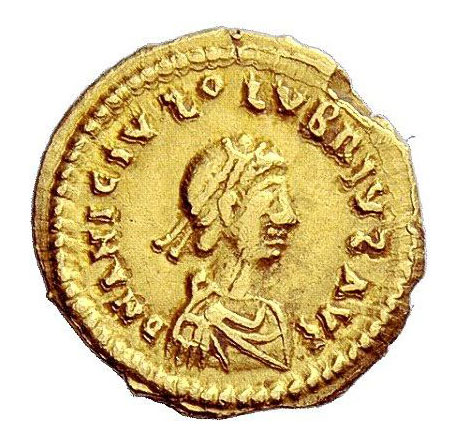Life: AD ? – 472

- Name: Anicius Olybrius
- Became emperor March/April AD 472.
- Wife: Placidia (one daughter; Juliana Anicia).
- Died November AD 472.
Olybrius was a member of the highly distinguished family of the Anicii which enjoyed excellent connections. One of Olybrius’ ancestors had been Sextus Petronius Probus, a powerful ministerial figure during the reign of Valentinian I. Meanwhile Olybrius himself was married to Valentinian III’s daughter Placidia the younger.
But most important of all were his connections to the Vandal court. Olybrius enjoyed good relations with king Geiseric whose son Huneric was married to Placidia’s sister Eudocia.
When in AD 465 Libius Severus died, Geiseric proposed Olybrius as a successor, hoping to increase his influence over the western empire. Though Leo, the emperor of the east, instead saw to it that in AD 467 his nominee, Anthemius, took the throne.
When alas the powerful ‘Master of Soldiers’ Ricimer fell out with Anthemius, Leo sent Olybrius to Italy to try and bring the two parties back together peaceably.
But as Olybrius arrived in Italy early in AD 472, Ricimer was already besieging Rome to see Anthemius killed. Their relationship was indeed irreconcilable.
However, Olybrius’ arrival in Italy was welcomed by Ricimer, for it provided him with a credible candidate to succeed his opponent Anthemius.
Leo realizing the danger of an emperor on the western throne who was a friend of the Vandals, sent a letter to Anthemius, urging him to see to it that Olybrius was assassinated. But Ricimer intercepted the message.
In any case Anthemius was most likely no longer in a situation to act. Shortly after, Rome fell and Anthemius was beheaded.
This left the way clear for Olybrius to succeed to the throne in March or April AD 472. Although Leo naturally refused to recognize his accession.
Only forty days after his conquest of Rome, Ricimer died a gruesome death, vomiting blood. He was succeeded as ‘Master of Soldiers’ by his nephew Gundobad.
But Olybrius was not to spend much time on the throne. Only five or six months after the death of Ricimer he too died from illness.

Historian Franco Cavazzi dedicated hundreds of hours of his life to creating this website, roman-empire.net as a trove of educational material on this fascinating period of history. His work has been cited in a number of textbooks on the Roman Empire and mentioned on numerous publications such as the New York Times, PBS, The Guardian, and many more.
